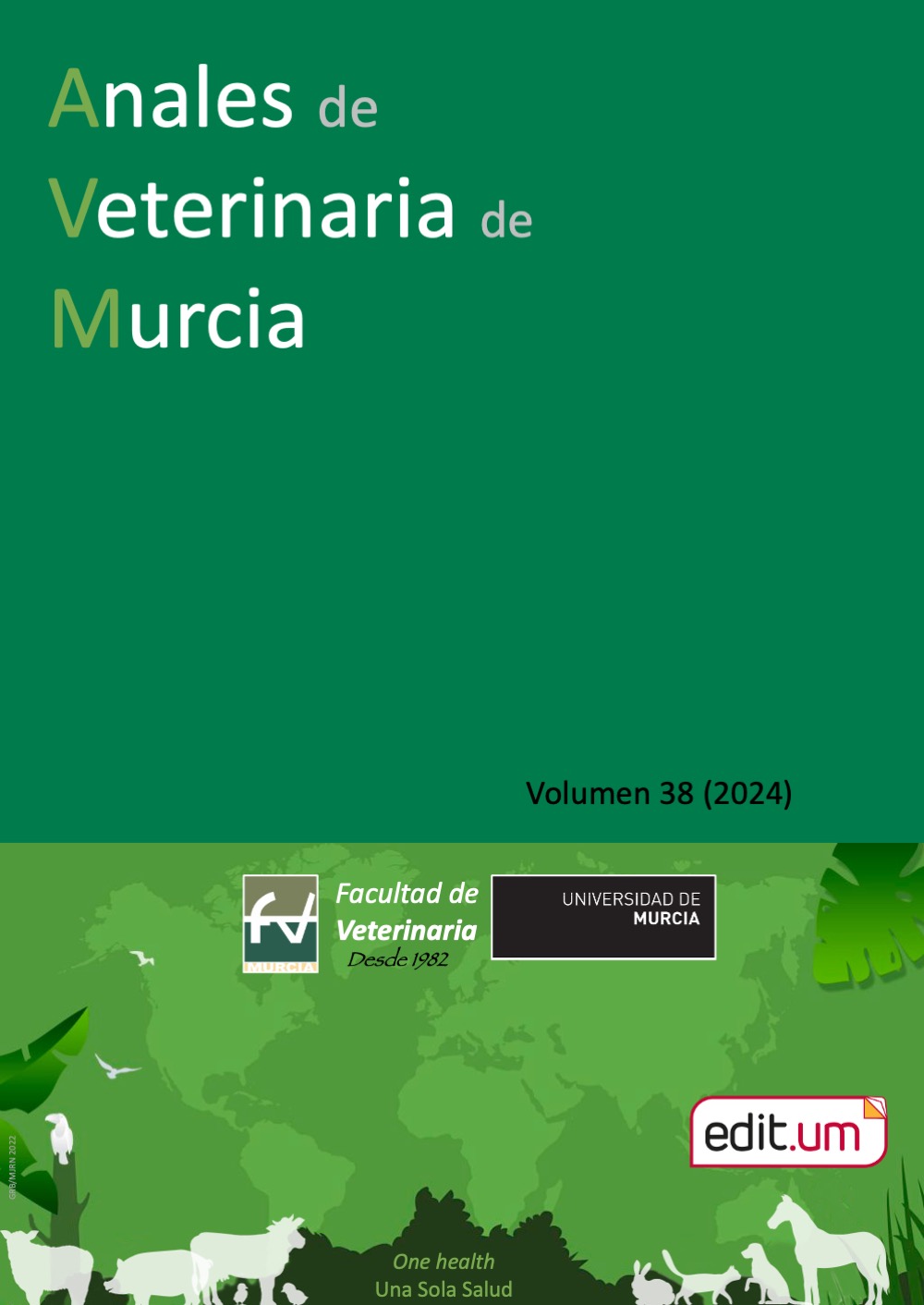DIAGNOSIS OF PARASITIC AND/OR BACTERIAL AGENTS BASED ON CLINICAL CASES PROPOSED IN AN INTERDISCIPLINARY WAY IN THE 2ND YEAR OF THE VETERINARY SCIENCE DEGREE
Abstract
During the academic year 2023-24, a Teaching Innovation Project (TIP) was carried out with students of the Veterinary Medicine Faculty of the University of Murcia, who were enrolled in two compulsory subjects of the second year: Microbiology I and Parasitology (both 1st semester, 4.5 ECTS credits). The Problem-Based Learning teaching method was used to integrate the practical knowledge acquired in both subjects. For this purpose, different clinical cases caused by bacterial or parasitic agents of veterinary relevance were presented. The students had to solve these clinical cases by correctly choosing the specific and common diagnostic techniques of both disciplines, thus bringing them closer to the real situation of diagnostic practice on Animal Health.
Participants in this TIP received, on a voluntary basis, a detailed description of a clinical case. As a group, they completed a questionnaire prepared by the teachers specifically for each case, using the "Exams" tool in the Virtual Classroom. At the end of the semester and after the practical sessions of both subjects, the different groups of students had to present the proposed clinical cases to the rest of their classmates in a face-to-face session. Their participation was considered in the evaluation of the two subjects involved and became part of the modulating percentage of their marks. At the end of the proposed TIP, the students completed a satisfaction survey, which allowed the collection of the students' opinions in an anonymous and objective way.
Downloads
-
Abstract238
-
pdf (Español (España))152
References
Abadía Valle, A. R., & Muñoz Gonzalvo, M. J. (2017). Introducción de metodologías activas en la docencia de una asignatura básica: Farmacología Veterinaria. REDU. Revista de Docencia Universitaria, 15(2), 11-33. https://doi.org/10.4995/redu.2017.5953
Araujo, U., & Sastre, G. (2008). El aprendizaje basado en problemas. Una nueva perspectiva de la enseñanza en la universidad. Barcelona, España: Editorial Gedisa.
Branda, L. A. (2013). El abc del ABP – Lo esencial del aprendizaje basado en problemas. Cuadernos de la Fundación Dr. Antonio Esteve (Nº 27), 16 pp.
Daza, S. F., Arrieta, J. R., Contreras, J. H., & Ríos, O. (2014). Interdisciplinariedad eje mediador en los procesos de enseñanza del programa de Medicina Veterinaria y Zootecnia en la Universidad de la Paz. https://doi.org/10.13140/RG.2.2.33833.80486
de-Jorge-García-Reyes, F. J., & de-Jorge-Huerta, L. (2020). El modelo de aprendizaje basado en casos clínicos. Revista Española de Casos Clínicos en Medicina Interna (RECCMI), 5(2), 57-59. https://doi.org/10.32818/reccmi.a5n2a1
Enríquez, L. O., & Mena, C. B. (2005). Habilitación profesional. Condiciones para el aseguramiento de la calidad de la educación médica y condiciones para la confianza recíproca: Experiencia y visión de ASOFAMECH. Revista médica de Chile, 133(4). https://doi.org/10.4067/S0034-98872005000400014
Feixas, M., & Martínez-Usarralde, M. J. (2022). La transferencia de los proyectos de innovación docente: Un estudio sobre su capacidad de transformar la enseñanza y el aprendizaje. Educar, 58(1), 69-84. https://doi.org/10.5565/rev/educar.1407
Fernández March, A. (2006). Metodologías activas para la formación de competencias. Educatio siglo XXI, 24, 35-56. Recuperado de http://revistas.um.es/educatio/article/view/152 [Último acceso: julio de 2024].
Furio, A. (2016). El trabajo cooperativo en grupo: Formación y puesta en práctica (Trabajo final de grado de maestro de educación primaria). Universidad Jaime I.
Gavilán, P., & Alario, R. (2010). Aprendizaje cooperativo. Una metodología con futuro. Principios y aplicaciones. Madrid: CCS. 260 páginas. Estudios Sobre Educación, 21, 240. https://doi.org/10.15581/004.21.4445
Malher, X., Bareille, N., Noordhuizen, J. P., & Seegers, H. (2009). A case-based learning approach for teaching undergraduate veterinary students about dairy herd health consultancy issues. Journal of Veterinary Medical Education, 36(1), 22–29. https://doi.org/10.3138/jvme.36.1.22
Thistlethwaite, J. E., Davies, D., Ekeocha, S., Kidd, J., MacDougall, C., Matthews, P., et al. (2012). The effectiveness of case-based learning in health professional education. A BEME systematic review: BEME Guide No. 23. Medical Teacher, 34, e421-444. https://doi.org/10.3109/0142159X.2012.680939
Williams, C., Gómez, G., & Soto-Suazo, M. (2022). Aprendizaje Basado en Casos Clínicos (CCBL): Una metodología activa aplicable a carreras de ciencias de la salud. Journal of Health and Medical Sciences, 8(3), 217-214.
Copyright (c) 2024 Servicio de Publicaciones, University of Murcia (Spain)

This work is licensed under a Creative Commons Attribution-NonCommercial-NoDerivatives 4.0 International License.
Creative Commons Attribution 4.0
The works published in this journal are subject to the following terms:
1. The Publications Service of the University of Murcia (the publisher) retains the property rights (copyright) of published works, and encourages and enables the reuse of the same under the license specified in paragraph 2.
© Servicio de Publicaciones, Universidad de Murcia, 2019
2. The works are published in the online edition of the journal under a Creative Commons Attribution-NonCommercial 4.0 (legal text). You can copy, use, distribute, transmit and publicly display, provided that: i) you cite the author and the original source of publication (journal, editorial and URL of the work), ii) are not used for commercial purposes, iii ) mentions the existence and specifications of this license.

This work is licensed under a Creative Commons Attribution-NonCommercial-NoDerivatives 4.0 International License.
3. Conditions of self-archiving. Is allowed and encouraged the authors to disseminate electronically pre-print versions (version before being evaluated and sent to the journal) and / or post-print (version reviewed and accepted for publication) of their works before publication, as it encourages its earliest circulation and diffusion and thus a possible increase in its citation and scope between the academic community. RoMEO Color: Green.




